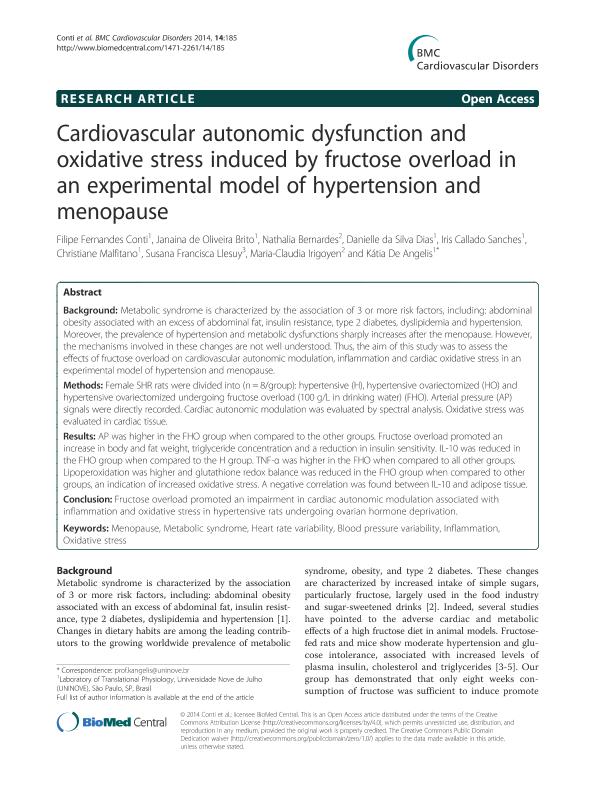Artículo
Cardiovascular autonomic dysfunction and oxidative stress induced by fructose overload in an experimental model of hypertension and menopause
Conti, Filipe Fernandes; Brito, Janaina de Oliveira; Bernardes, Nathalia; Dias, Danielle da Silva; Sanches, Iris Callado; Malfitano, Christiane; Llesuy, Susana Francisca ; Irigoyen, Maria-Claudia; De Angelis, Kátia
; Irigoyen, Maria-Claudia; De Angelis, Kátia
 ; Irigoyen, Maria-Claudia; De Angelis, Kátia
; Irigoyen, Maria-Claudia; De Angelis, Kátia
Fecha de publicación:
12/2014
Editorial:
BioMed Central
Revista:
Bmc Cardiovascular Disorders
ISSN:
1471-2261
Idioma:
Inglés
Tipo de recurso:
Artículo publicado
Clasificación temática:
Resumen
Background: Metabolic syndrome is characterized by the association of 3 or more risk factors, including: abdominal obesity associated with an excess of abdominal fat, insulin resistance, type 2 diabetes, dyslipidemia and hypertension. Moreover, the prevalence of hypertension and metabolic dysfunctions sharply increases after the menopause. However, the mechanisms involved in these changes are not well understood. Thus, the aim of this study was to assess the effects of fructose overload on cardiovascular autonomic modulation, inflammation and cardiac oxidative stress in an experimental model of hypertension and menopause. Methods: Female SHR rats were divided into (n = 8/group): hypertensive (H), hypertensive ovariectomized (HO) and hypertensive ovariectomized undergoing fructose overload (100 g/L in drinking water) (FHO). Arterial pressure (AP) signals were directly recorded. Cardiac autonomic modulation was evaluated by spectral analysis. Oxidative stress was evaluated in cardiac tissue. Results: AP was higher in the FHO group when compared to the other groups. Fructose overload promoted an increase in body and fat weight, triglyceride concentration and a reduction in insulin sensitivity. IL-10 was reduced in the FHO group when compared to the H group. TNF-α was higher in the FHO when compared to all other groups. Lipoperoxidation was higher and glutathione redox balance was reduced in the FHO group when compared to other groups, an indication of increased oxidative stress. A negative correlation was found between IL-10 and adipose tissue. Conclusion: Fructose overload promoted an impairment in cardiac autonomic modulation associated with inflammation and oxidative stress in hypertensive rats undergoing ovarian hormone deprivation.
Archivos asociados
Licencia
Identificadores
Colecciones
Articulos(IBIMOL)
Articulos de INSTITUTO DE BIOQUIMICA Y MEDICINA MOLECULAR
Articulos de INSTITUTO DE BIOQUIMICA Y MEDICINA MOLECULAR
Citación
Conti, Filipe Fernandes; Brito, Janaina de Oliveira; Bernardes, Nathalia; Dias, Danielle da Silva; Sanches, Iris Callado; et al.; Cardiovascular autonomic dysfunction and oxidative stress induced by fructose overload in an experimental model of hypertension and menopause; BioMed Central; Bmc Cardiovascular Disorders; 14; 1; 12-2014; 1-7
Compartir
Altmétricas



